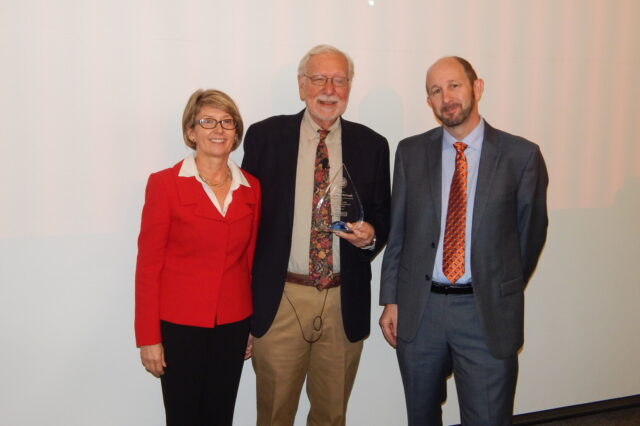Brain Awareness Week kicks off at UF with a look into highly superior memory

It’s exceptionally rare to be able to recall precise, mundane details of day-to-day life many years later, and the study of people who can offers a window into understanding how long-term memories are made. So explains renowned neuroscientist James L. McGaugh, Ph.D., who on Monday shared his findings of “highly superior autobiographical memory” with a standing-room-only crowd at the Evelyn F. and William L. McKnight Brain Institute of the University of Florida.
McGaugh, research professor of neurobiology and behavior at the University of California, Irvine, presented his findings on some remarkable research subjects — adults and children — who can recall vivid details such as what the weather was like on a specific date many years earlier as fluidly as if telling you what they had for lunch a few hours ago.
Delivering the fifth annual William G. Luttge Lectureship in Neuroscience to kick off UF’s celebration of Brain Awareness Week, McGaugh also described his groundbreaking research into the influence of emotion on memory.
“Stress hormones allow us to have selective memory of the things that are important,” McGaugh said. “And yet these people (who have superior memory) have memory of the things that are unimportant in addition to the important.”
The Luttge Lectureship, sponsored by the McKnight Brain Research Foundation, honors the memory of the late visionary neuroscientist William G. “Bill” Luttge, Ph.D., the founding director of UF’s Brain Institute.
Luttge started his career as a student under McGaugh at UC Irvine.
“I’m delighted to be here for a lecture honoring the memory of his contributions,” McGaugh said.
In his lab, McGaugh is examining whether highly superior autobiographical memory, or HSAM, occurs naturally or develops over years of experience in learning to store and retrieve information. Thus far, his team has identified some common characteristics of people with this ability: They are not exceptional in learning on laboratory tests, for example, and they tend to show signs of compulsiveness.
“We’re puzzled by the fact that we have identical twins, and one who has the ability and one who does not,” he said.
Brain Awareness Week continues at UF with outreach programs to more than 2,100 children in the community. Sixty UF undergraduate and graduate students in neuroscience are leading workshops at 16 schools in Gainesville as well as at the McKnight Brain Institute to share enthusiasm for learning about the brain.
Part of a global campaign to increase public awareness for brain research, UF’s Brain Awareness Week events are hosted by members of the North Central Florida Chapter of the Society for Neuroscience.
About the author
